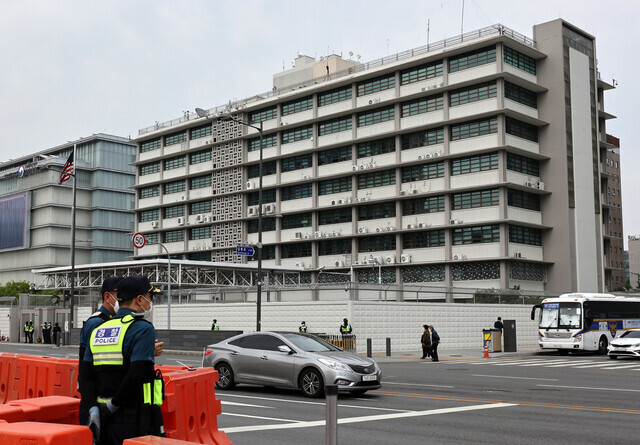hankyoreh
Links to other country sites 다른 나라 사이트 링크
US Embassy in Seoul’s unpaid internship program draws renewed criticism

A 22-year-old Korean university student surnamed Park who has long hoped to get a job abroad was recently flabbergasted by a post about an internship at the US Embassy in South Korea. The six-month internship involved 40 hours of work a week, but was unpaid.
“I think they ought to call it a volunteer position rather than an internship,” Park quipped.
The US Embassy is back in the spotlight over its unpaid intern program, which has now been running for 20 years, since 2005. Ten years ago, foreign embassies and branches of international organizations came under fire for luring unpaid interns with the chance to build their resumes, but little has changed since then. Experts say that, depending on the actual work involved, unpaid internships of this sort may be in violation of the law.
The US Embassy in Korea selected 24 Korean university students who applied for its foreign national student intern program for the first half of 2024. There are two rounds of internships each year, one for the first half and one for the second half.
Successful candidates for the internship are assigned to the public diplomacy department, the political department and the commerce department inside the embassy for up to six months of unpaid work. The interns are generally expected to work a 40-hour week of eight-hour days, but they’re allowed to work less if they’re balancing the internship with their studies.
Korean law distinguishes between interns, as trainees gaining work experience, from actual workers, who provide work in exchange for wages, and unpaid internships are permitted under law. But when interns provide actual work, they are recognized as workers under the Labor Standards Act and are eligible to receive legal protection as such.
Needless to say, unpaid labor is illegal in Korea.
“The situation might be different if [their work hours] are only filled with education. But if they show up at the office and are assigned tasks during their given hours, they obviously ought to be paid,” said Kim Seung-hyeon, a labor attorney with Siseon, a labor law office.

The US Embassy’s position is that it operates the internship in a manner that does not contravene the law.
“We’re in compliance with all labor laws in both the US and Korea. Our programs are organized so that all interns can receive appropriate mentoring and guidance; all interns are allowed to participate in a range of special programs that are designed to supplement the embassy’s work, and we provide educational and learning sessions. Our interns work at the embassy voluntarily in full knowledge of the benefits provided by the internship and the fact that it’s unpaid,” an embassy official said.
However, one former intern for the US Embassy reported handling embassy events and doing administrative work that basically amounted to what contractual workers would do.
While work experience at an embassy helps buff the resumes of students hoping to work at international organizations, such opportunities are limited, which makes it less likely that official objections will be raised about internships of this sort.
The Ministry of Employment and Labor’s guidelines for protecting interns and determining their legal status stipulates that interns should be regarded as workers under the following circumstances: when they’re regularly assigned work required by the position without any job training program, when they’re used in place of workers in positions where there is a shortage of workers either regularly or at specific times, or when education and training are so simple or repetitive that it’s evident the intern was mainly brought on to provide labor in the first place.
“This is an issue that needs to be decided by taking into consideration the actual work being done,” said an official with the Ministry of Employment and Labor. But that official added that if investigators determine an intern is actually a worker, the intern can petition for back pay.
The US Embassy is effectively the only diplomatic mission in Korea that hires unpaid interns on a regular basis. The Danish Embassy also hires interns two times a year, but those interns are paid.
By Kim Chae-woon, staff reporter; Shim Wu-sam, staff reporter
Please direct questions or comments to [english@hani.co.kr]

Editorial・opinion
![[Column] Samsung’s ‘lost decade’ and Lee Jae-yong’s mismatched chopsticks [Column] Samsung’s ‘lost decade’ and Lee Jae-yong’s mismatched chopsticks](https://flexible.img.hani.co.kr/flexible/normal/500/300/imgdb/original/2024/0512/3017154788490114.jpg) [Column] Samsung’s ‘lost decade’ and Lee Jae-yong’s mismatched chopsticks
[Column] Samsung’s ‘lost decade’ and Lee Jae-yong’s mismatched chopsticks![[Correspondent’s column] The real reason the US is worried about Chinese ‘overcapacity’ [Correspondent’s column] The real reason the US is worried about Chinese ‘overcapacity’](https://flexible.img.hani.co.kr/flexible/normal/500/300/imgdb/original/2024/0510/5217153290112576.jpg) [Correspondent’s column] The real reason the US is worried about Chinese ‘overcapacity’
[Correspondent’s column] The real reason the US is worried about Chinese ‘overcapacity’- [Editorial] Yoon’s gesture at communication only highlights his reluctance to change
- [Editorial] Perilous stakes of Trump’s rhetoric around US troop pullout from Korea
- [Guest essay] Preventing Korean Peninsula from becoming front line of new cold war
- [Column] The state is back — but is it in business?
- [Column] Life on our Trisolaris
- [Editorial] Penalties for airing allegations against Korea’s first lady endanger free press
- [Editorial] Yoon must halt procurement of SM-3 interceptor missiles
- [Guest essay] Maybe Korea’s rapid population decline is an opportunity, not a crisis
Most viewed articles
- 1[Column] Samsung’s ‘lost decade’ and Lee Jae-yong’s mismatched chopsticks
- 2Seoul’s plan to adopt SM-3 missiles is like wanting a sledgehammer to catch a fly
- 3‘We must say no’: Seoul defense chief on Korean, USFK involvement in hypothetical Taiwan crisis
- 4[Correspondent’s column] The real reason the US is worried about Chinese ‘overcapacity’
- 5S. Korea “monitoring developments” after report of secret Chinese police station in Seoul
- 6Korea poised to overtake Taiwan as world’s No. 2 chip producer by 2032
- 7Yoon rejects calls for special counsel probes into Marine’s death, first lady in long-awaited presse
- 8[Book review] Who said Asians can’t make some good trouble?
- 9Higher education in Korea becoming increasingly polarized
- 10Survey: 60% of S. Koreans don’t have enough time, 82% are tired